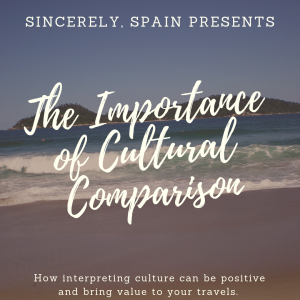
All Places are Different: Preparing for a Culture Comparison
Dear Silvia,
Logically we know that different places are different—they have their own cultures and, ergo, distinct traditions, ways of interactions, languages, etc. However, have you really sat down to think about how much culture forms the way we think about the world and culture differences might be impacting your international/intercultural experiences? Today I want to talk about culture comparison in a good way because when you start opening yourself up to the idea that differences are nothing more than differences (and not someone trying to hurt you or take advantage of you), you are able to be more open to creating different kinds of relationships.
We have previously defined culture as “the symbolic forms that serve as a way to feel and express meaning within a specific community.” This means that everything from the words we use to the way we say them and how we interact using them can be included within this scope. By studying and taking into account these factors when having intercultural interactions, I hope you will be able to see these differences in a way that leads towards acceptance before judgment.
Note: I would not say that I know everything there is to know about cultural and cultural differences. However, as someone who has been to over 30 countries, lived in 5 fairly different cultures, and has studied this subject, I do have some experience in the matter.
 Culture impacts so much
Culture impacts so much
Culture is something we talk about all the time without actually thinking about the impact that it has on our daily lives. For example, we easily recognize some things that people do differently in other countries as being ‘cultural’ but we hardly ever acknowledge our own behavior as such. In this sense, culture is a very egocentric idea—we internalize the things that are part of our own culture and we tend to judge actions and thoughts that differ from what we consider to be ‘normal.’ However, we should all begin to acknowledge and understand that many of the daily actions we take are also impacted and conditioned by the culture(s) we find around us.
In our introduction to cultural competences, I spoke about awareness being the first step towards being able to interact with people from different places and different social expectations. This awareness is strongly tied to understanding the importance that culture has on our everyday lives; conditioning our perceptions of the world, our interactions, and even our hopes and dreams. Not questioning how your own culture has conditioned and shaped you is like expecting to understand how a cell works without every studying cell theory. By working to understand how culture is made up and what elements are important to its interpretation, you will be better equipped to spend time abroad or create meaningful relationships with people who are different to you.
Culture Comparison
There are many ways to compare culture and from the beginning of interactions with different people, humans have been extrapolating importance from differences. In addition, from the first anthropologists and sociologists, social scientists have been working towards a deeper understanding of these differences, why they came to be, and the impacts they have on society. However, for the everyday traveler or the assigned expat, this type of cultural study is just not practical.
At the same time, being prepared before you go is a good way to make sure you are aware of the situation (both from the perspective of your own culture and from the culture(s) you are going to). There are many ways to go about interpreting the important parts of different cultures and, therefore, many ways of studying these differences. One free tool that I really like is the Compare Culture tool* that was developed by Hofstede Insights. This tools says that most differences in national culture can be explained by six dimensions—power distance (low to high), individualism (vs collectivism), masculinity (vs femininity), uncertainty avoidance (low to high), long-term orientation (vs short term orientation), and indulgence (vs restraint). You can read more about the dimensions here.
I understand that no matter how you try to define culture, there will be people who believe that it should be looked at differently. Therefore, the above structure is one that I personally like but I if you want to look at culture through a different lens, I am not going to judge. By deciding to study culture itself and the differences that we can see among people around the world from a neutral point of view, I believe you are setting yourself up for a higher probability of success with your intercultural exchanges.
How you can use your knowledge to get ahead
The reason I believe in understanding culture (as in the general—what is culture?) before you spend time abroad or interacting with people from different backgrounds is that I believe that it will help you have more productive/fun interactions with them. If you gain certain knowledge about a culture itself—everything from its language to its customs—you are more likely to be able to understand why people act and interact as they do.
 This understanding can be extremely beneficial. It can have positive impact on everything from your career options to your ability to make friends with someone who speaks a different language from you. In addition, it can help you find understanding in an uncomfortable situation. This is because, if you know enough about it, culture can more often than not explain why situations make you feel really safe or completely unsafe. Now, I don’t want to say that you should never feel uncomfortable (in fact, I am a big believer in following your gut), but that by viewing culture in its entirety you should be able to understand differences as being someone else’s ‘normal.’
This understanding can be extremely beneficial. It can have positive impact on everything from your career options to your ability to make friends with someone who speaks a different language from you. In addition, it can help you find understanding in an uncomfortable situation. This is because, if you know enough about it, culture can more often than not explain why situations make you feel really safe or completely unsafe. Now, I don’t want to say that you should never feel uncomfortable (in fact, I am a big believer in following your gut), but that by viewing culture in its entirety you should be able to understand differences as being someone else’s ‘normal.’
At the end of the day, I love culture. I love how, despite all the differences, people from around the world create relationships, become friends, fall in love, etc. I could not imagine my life without the people who are from different backgrounds than I am; these are people who have grown up speaking different languages and celebrating different traditions that I have but who are equally as important in the world as people who grew up with me. However, if I didn’t make space for their differences in my life, I might never have been able to experience the possibility that living in an intercultural space has offered me. Without this openness and understanding, I wouldn’t be where I am right now because I wouldn’t be able to accept the differences and that would make for a less colorful life than the one that I have the privilege to lead.
So, what are you doing to prepare yourself for cultural differences when you are traveling or moving abroad? Do you jump in, head first or do you study the culture before you get there? And, most importantly, do you accept that good and bad ways of doing things are often just in the eyes of the beholder?
Sincerely,
Spain
*The cultural comparison sited is one of many potential comparisons you can use. This is not a sponsored post but I do truly believe in the idea that this free tool offers.




